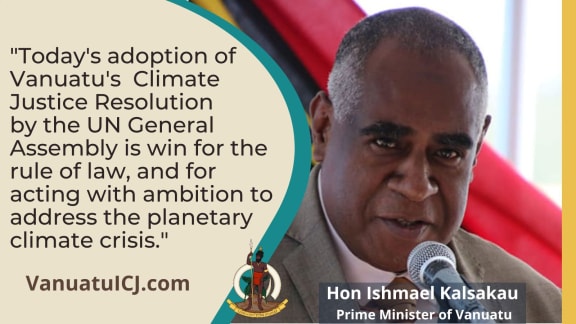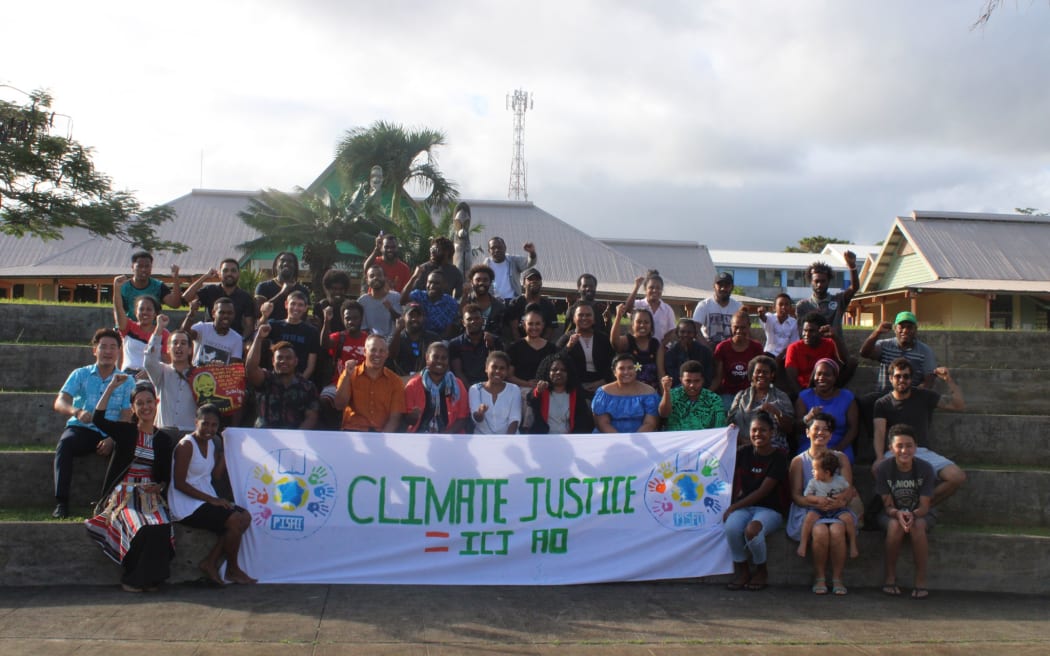The UN General Assembly has adopted a Vanuatu-led resolution calling for an advisory opinion from the International Court of Justice (ICJ) on climate change and human rights.
The resolution was tabled by Vanuatu and a core group of 17 countries, aiming to clarify what the obligations of states are in protecting the rights of current and future generations from the adverse effects of climate change.
The motion, sponsored by more than 130 countries, was greeted with cheers.
The ICJ will now prepare an advisory opinion that could be cited in climate court cases.
Vanuatu is one of the worst-affected nations affected by the climate crisis. Earlier this month, the country was hit by two Category 4 tropical cyclones in less than five days, which is estimated to cost Vanuatu more than half of its annual gross domestic product.
“Today we have witnessed a win for climate justice of epic proportions,” said Vanuatu Prime Minister Ishmael Kalsakau.
“Vanuatu sees today’s historic resolution as the beginning of a new era in multilateral climate cooperation, one that is more fully focused on upholding the rule of international law and an era that places human rights and inter-generational equity at the forefront of climate decision-making,” he said.
“The very fact that a small Pacific island nation like Vanuatu was able to successfully spearhead such a transformative outcome speaks to the incredible support from all corners of the globe.”

Kalsakau said he was celebrating the move but sees it is a “win” for the nation.
“I celebrate today with the people of Vanuatu, who are still reeling from the devastation from two back-to-back cyclones this month, caused by the fossil fuels and greenhouse emissions that they are not responsible for. To my people, today shows us that the world stands with Vanuatu.
“This celebration is a win for the rule of law, for protecting human rights, for improving multilateral climate cooperation, for climate justice and for acting with ambition to address the planetary climate crisis.
Vanuatu’s Climate Change Minister Ralph Regenvanu called the move “a shift in narrative which may yield greater climate action and ambition among all states in the global community”.
Youth can play a part in saving planet
Pacific Island Students Fighting Climate Change played a key role in the campaign, and spokesman Solomon Yeo said the move shows that Pacific youth can play a part in tackling climate change.
“Today we celebrate four years of arduous work in convincing our leaders and raising global awareness on the initiative. We commend the undying support of our Pacific civil society organisations, communities, and youth who, without their support, we would not have ventured this far,” he said.
“The adopted resolution is a testament that Pacific youth can play an instrumental role in advancing global climate action.
“This further solidifies why young people’s voices must remain an integral part of the process. Now the first stage is over, we look to join hand-in-hand with governments and partners in bringing the world’s biggest problem to the world’s highest court.”

Oxfam Aotearoa has congratulated the student group for its role in the campaign.
Its climate justice lead, Nick Henry, said the world’s governments, especially in rich countries, must urgently take stronger action to reduce greenhouse gas emissions and stop the climate crisis getting worse.
He said a strong opinion from the International Court of Justice would help to hold governments to account on their obligations to act.
“To put this into perspective, the last comparable opinion was in 1996, when, after a long campaign from civil society, the ICJ issued an advisory opinion on nuclear weapons that was critical to nuclear disarmament and keeping the Pacific nuclear free.”
The UN Human Rights chief Volker Türk said the resolution could be an important catalyst for the “urgent, ambitious and equitable climate action that is needed to stop global heating” and to limit and remediate climate-induced human rights harms.
The move comes as the latest Intergovernmental Panel on Climate Change report that says current action and plans are insufficient to keep warming below 1.5 degrees.
The core group of countries behind the resolution also includes Pacific nations Federated States of Micronesia, Samoa and New Zealand, as well as Angola, Antigua & Barbuda, Bangladesh, Costa Rica, Germany, Liechtenstein, Morocco, Mozambique, Portugal, Romania, Sierra Leone, Singapore, Uganda, and Vietnam.
This article is republished under a community partnership agreement with RNZ.
This content originally appeared on Asia Pacific Report and was authored by APR editor.